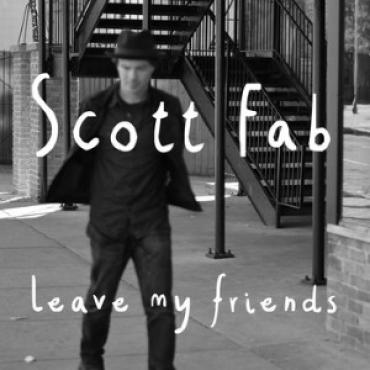Scott Fab— Retro and Modern But Not Like You Might Expect

Scott Fab is retro without being retro and I could not be more thrilled. I should be saying retro to me because I am sure a very small portion of you were into music back in the late-sixties and early-seventies, if alive at all, and most of you who were didn’t dig as deep as I did. Sure, there was Zeppelin and The Beatles and Floyd and all that, but I was lucky enough to have grown up in the Willamette Valley of Oregon where radio made music an adventure— for a short period of time, anyway. I was very surprised, in fact, to hear Fab sounding like a conglomeration of some of my favorites in the days during which folk was growing up and absorbing the other genres much like it does today (They call a lot of it Americana, in case you were wondering).
You see, I was there before James Taylor busted through and while most of you won’t believe it, when John Denver dominated Country and Rock radio. I heard Country Rock, pre-Eagles, and was quite amazed when The Eagles became as big as they did. Before Joni Mitchell became a household name, I watched her open up her fans to a whole new world of music— many called it jazz but it was more of a melding of styles and without that Mitchell bridge, many would have had to wait to explore beyond the Folk and Pop.
I was also there when radio station KZEL in Eugene threw caution to the winds and allowed their disc jockeys pretty much free rein when it came to programming the music. A couple of the jocks embraced whatever albums were placed in the new release box, so we were treated to the likes of Denver and Gordon Lightfoot and Mitchell and, basically, the less Rock side of music. We were also given access to the likes of Jim Dawson and Bill Puka and Pacheco & Alexander and Stu Nunnery and Dalton & DuBarri, an offshoot of Boones Farm, and so many more. This possibly was the beginning of the singer/songwriter phase of music— the very early seventies— and I loved it. At any time you would hear Jimmie Spheeris or John Prine spliced between Lightfoot and Taylor and sometimes between “Maggot Brain” and “Four-Cornered Room.” God, radio was good then!
The reason I bring all this up is that Scott Fab echoes that period beautifully. With light acoustic guitar and a voice very much like many of the early-seventies singers, he takes me back while carrying me forward. The fact that his writing skills are topnotch helps as does the production which is hands off as much as it is hands on. Some songs are sparse and minimal in terms of backup. Some utilize full band. Each seems to hit just the right note— ten of them, in fact.
Leave My Friends is a beautifully crafted album, perfect for today but reaching into the past, whether meant to or not. Makes me want to break out my Jim Dawson and Jimmie Spheeris albums again. Makes me want to stop and really listen again. Makes me want to find out what else Fab has out there. In fact, that is exactly what I’m going to do. I could use some more retro-modern music. I wonder if people are going to call this folk.


